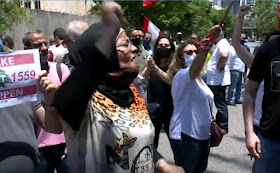Its main recommendation is for the US to engage in "coercive diplomacy:"
Another approach is to use coercive diplomacy to compel Hezbollah to abide by UNSCR 1701. To this end, the United States, often represented by mediator Amos Hochstein, is using diplomacy to negotiate with Lebanese leaders, and thus indirectly with Hezbollah, while Israel is putting military pressure on the group through a mix of strikes on Hezbollah forces and leaders. The renewed threat of an all-out war gives this pressure additional strength. Hezbollah, however, does not want to be seen as surrendering to Israeli pressure, particularly at a time when Israeli attacks on Palestinians are dominating the headlines.
That last line undermines the approach, but CSIS cannot come up with anything better.
Yet there is an alternative, and the seeds for it can be seen in the same document. It says, "Hezbollah seeks broader popularity in Lebanon, and triggering a destructive war could grievously undermine support, particularly outside its Shiite core constituency."
Hezbollah is not afraid of Israeli escalation, because it positions itself as the resistance against Israel. Its honor/shame mindset would never allow it to back down and appear to kowtow to Israel.
It is not afraid of the Lebanese government or army, which is can bully at will.
But Hezbollah is afraid of Lebanese public opinion.
As I've argued previously, the Lebanese people hold the key to stop a true catastrophe that nobody wants. Only if they rise up and protest Hezbollah's escalations can Hezbollah end its attacks on Israel and maintain its perceived honor, by doing the will of the people it pretends to defend.
The Lebanese people know that Hezbollah is not "defending Lebanon," but rather bringing Lebanon closer to destruction. Most of them oppose Hezbollah and a few are speaking up. They need to be supported by the world community.
In 2020, there were some small protests by Lebanese citizens in Beirut demanding Hezbollah adhere to UNSCR 1701 and Lebanon implement UNSCR 1559 disarming Hezbollah among other demands.
The Lebanese know that Hezbollah is sensitive to their public opinion. During anti-Hezbollah protests in 2019, the terror group got very nervous, and they sent thugs to threaten and attack the demonstrators, as well as the army that tried to separate the two groups. They threw stones and, according to reports, "explosive devices."
Part of the reason that anti-Hezbollah protests are not in the streets in force is that the Lebanese majority does not feel like they have any real political, financial or moral support from the rest of the world. Those protests fizzled just as the anti-Iran protests fizzled - they did not get enough external support, and that support is critical to shore up the bravery necessary to stand up to Iranian intimidation in both countries.
There is no shortage of governments that say they do not want to see a war in Lebanon. There is no shortage of NGOs on Earth that advocate peace. There are plenty of media organizations who write passionate op-eds decrying the devastation of Gaza who would write the same about Lebanon during any war.
Now is the time to act against war, not when it breaks out.
Lebanese anti-Hezbollah groups need to be identified and promoted in the media. Anti-Hezbollah voices need to be highlighted now by NGOs who claim to care about peace and human rights. Governments, especially the US and France, must work to publicly support the Lebanese people against the Iranian proxy that is bringing Lebanon to the brink. This is not a time for wishy-washy "both sides"-ism.
Behind the scenes, the West can engage in the sorts of covert social media initiatives that are now ubiquitous by Russia, by anti-Israel forces and by political campaigns. Financial incentives to help Lebanon's economy can be conditioned on Hezbollah's withdrawal from the southern border.
There are plenty of things the West can do to weaken Hezbollah, but the main power comes from the Lebanese people, and those people need to be strengthened by everyone who wants to avoid Lebanon's collapse.



